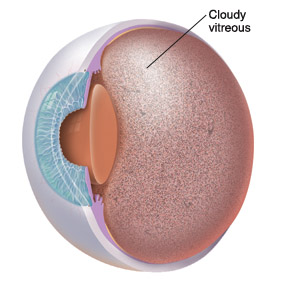Diabetic Retinopathy: Having Vitrectomy
You have diabetic retinopathy, a condition that occurs when diabetes damages blood vessels in the rear of the eye. It can cause cloudy vision and other problems. But a surgical procedure called vitrectomy may help make your sight clearer.
What Is Vitrectomy?
When healthy, vitreous (the gel that fills the eye) is clear. But with diabetic retinopathy, it can become clouded with blood or debris. During vitrectomy, the eye doctor removes the cloudy vitreous and replaces it with fluid or gas. This can help make your vision clearer. But if vision problems continue after vitrectomy, additional surgery may be needed.
Preparing for the Procedure
Tell your doctor about all medications, herbal remedies, and supplements you take. This includes aspirin, ibuprofen, ginkgo, Coumadin (warfarin), or other blood thinners. Before surgery, an anesthesiologist (a doctor who provides medication to control pain) will meet with you. You'll talk about the type of anesthetic (pain medication) that will be used during the surgery.
During the Procedure
During the surgery, tiny instruments are inserted through small incisions in the sclera (white of the eye). The vitreous is removed. It is replaced with saline (saltwater) solution or a gas bubble that holds the retina in place. The procedure may take several hours.
Following the Procedure
Be sure to have an adult family member or friend drive you home after the procedure. Wear dark sunglasses on the way home. Before leaving, you'll be told how to protect and care for your eye. Don't rub, touch, or bump your eye. Ask your doctor how long you need to avoid lifting, exercising, or swimming. Also, ask when you can drive and return to work.
Controlling Pain
Vitrectomy may cause some pain. You'll be given medication to control this pain. If discomfort continues, tell your doctor.
Risks and Complications of Laser Treatment
When to Call Your Doctor
If pain or vision worsens after you go home, call your eye doctor right away.
 Please visit us at our new location:
Please visit us at our new location: